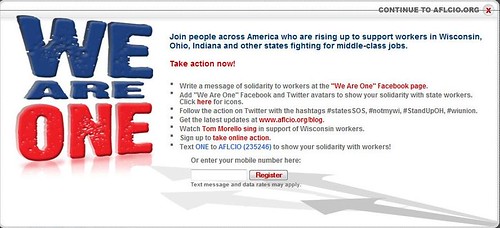Anti-worker actions have been taking place in Wisconsin, Ohio and New Jersey. Wisconsin has been the key battle ground and Sharon Black (Workers World) reported Wednesday, "Seasoned trade unionists from the Steel Workers union joined high school and college students. People facing their first-ever arrest came with their children. Hundreds who spent sleepless nights on the cold marble floors had forged bonds of friendship that kept them strong." What makes Wisconsin key is the governor, Scott Walker, attempting to do away with collective bargaining for state workers. Collective bargaining?
Collective bargaining gives workers a seat at the table in decision making. It allows one person to represent the employees in the negotiations with employers. Without collective bargaining, there's no seat at the table, there's no negotiation rights. Which is why Walker's attack on workers, to be successful, has to do away with collective bargaining.
Collective bargaining is one of the powers unions have and, throughout the history of this country, unions have fought for and won many cherished things that we now consider the norm -- for example, a living wage, the "weekend" (or two days off a week, where ever those two days fall for you) and an end to forced labor for children.
You might call the union the people's defender. At least you might if you weren't AFLO-CIO President Richard Trumka. Thursday, Judy Woodruff (PBS' NewsHour) spoke with Trumka about . . . Well who can be sure with Trumka's responses?
JUDY WOODRUFF: Well, let me -- I want to pick up on that, because, you know, making that point, are you -- how worried are you that, if Governor Walker wins this argument in Wisconsin, that there could -- that it just builds and makes stronger the argument against unions in these other states? I mean, we already see this.
RICHARD TRUMKA: Look, this isn't an argument about unions. This isn't about unions.
It's not? Then why should we give a ___?
Seriously, that's the best the president of the AFL-CIO can do?
And what's with the other 'leaders' and their soundbytes of "solidarity" and "brothers and sisters" and "comrades"?
Sweet Thursday! What crawled off the Tortilla Flat in search of The Pearl in the midst of The Winter Of Our Discontent?
Do you not get it?
Do we need to go all Grapes of Wrath to make the point?
"The kids. You ought to see them. Little boils, like, comin' out, an' they can't run aroun'. Give 'em some windfall fruit, an' they bloated up. Me, I'll work for a little piece of meat."
John Steinbeck, great writer. Really captured elements of his time. His time. Which has passed.
And you end up looking pretty silly to those not already vested in your cause when you're on TV attempting to rally people to your side with "comrade," "brothers & sisters" and "solidarity" among other terms.
Think language doesn't matter? Pioneer Press reported on public opinion yesterday:
A new Ramussen survey of Wisconsin voters showed that 52 percent oppose the weakening of collective bargaining rights and 39 percent favor it. Nationally, Rasmussen reported a week ago, 47 percent of voters support Walker and 42 percent support the unions.
The Quinnipiac University poll, meanwhile, found 45 percent of American voters saying that, to reduce state deficits, collective bargaining for public employees should be limited, while 42 percent oppose limits on collective bargaining.
Quinnipiac also found that voters -- by the large margin of 63 percent to 31 percent -- say government workers should pay more for benefits and retirement programs.
Those aren't good numbers. When the numbers are that low, either unions are the problem or the way the message is presented is the problem. Our opinion is it's the latter.
You want to move beyond limited support? Work on your messaging.
"WE ARE ONE" reads the AFL-CIO splash screen. If we are one, we need to speak in a common language.

"Solidarity"? Try "shoulder-to-shoulder." "We stand shoulder-to-shoulder." Try "support." And when they made their little splash screen, did the ALF-CIO not grasp how many workers aren't unionized?
"Solidarity" is a term that, in fact, means union. Assuming people do know the various definitions for the term, how is Jo/e Marsh supposed to show "solidarity" with you when s/he works at a non-union job?
The AFL-CIO gives the amount of union members in the US -- for all unions, not just their own: 14.7 million (and their graph notes a downward trend since 1995). That's a tiny number when you realize that the 2010 US Census charts over 300,000,000 people in the US.
In other words, many, many more people are not union members than are. And those who aren't union members but would like to show their support? They're not being reached with faulty language from speakers and splash screens.
What's taking place is not the Bolshevik Revolution. Workers are under attack in the 21st century. You want to help workers, then you need to speak in relatable ways or else you're never going to persuade anyone. When your outdated language makes them laugh at you, you've built a wall between you and them.
And if you sound like a liar, they aren't going to trust you. Richard Trumka, if what's going on has nothing to do with unions, why are you talking about it? Why are unions protesting what's happening?
If you're a leader of a union and you're marking ridiculous claims, you're not just destroying your own credibility, you're destroying the credibility of the unions.
------------
For more on these topics, see Ruth's "Use language to communicate, not to confuse," C.I.'s "Iraq snapshot" and Trina's "Iraq snapshot" from last week.